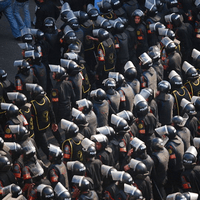There's no way to predict what will unfold in Egypt in the days and weeks ahead. Will protests continue until President Hosni Mubarak is overthrown? Will the military and security services initiate a full-scale crackdown in the name of restoring law and order? What will instability in the largest country in the Arab world portend for the Middle East as a whole?
The U.S. national security establishment, of necessity, is in reactive mode right now as it assesses these questions. However, to the extent that Washington can shape the situation, what are some of the lessons from other "regime changes" that might be applicable?
Have Hosni Mubarak finish his term of office. This can be difficult once a "rage from below," suppressed for years, boils to the surface, and the crowds' immediate demand is for the leader to go quickly. But there is a negative after-effect of such sudden divestitures -- as we've seen, for instance, in Georgia, where no post-Soviet president has yet completed his term of office. Once the precedent is set that a president is removed, not by the election cycle, but by street protests, it encourages subsequent political movements to try and take power via crowds rather than due process. If Mubarak does step down, then the recently named Egyptian vice president, Omar Suleiman, should temporarily assume the office -- but with the clear understanding that he would be a temporary, caretaker president until the September elections.

